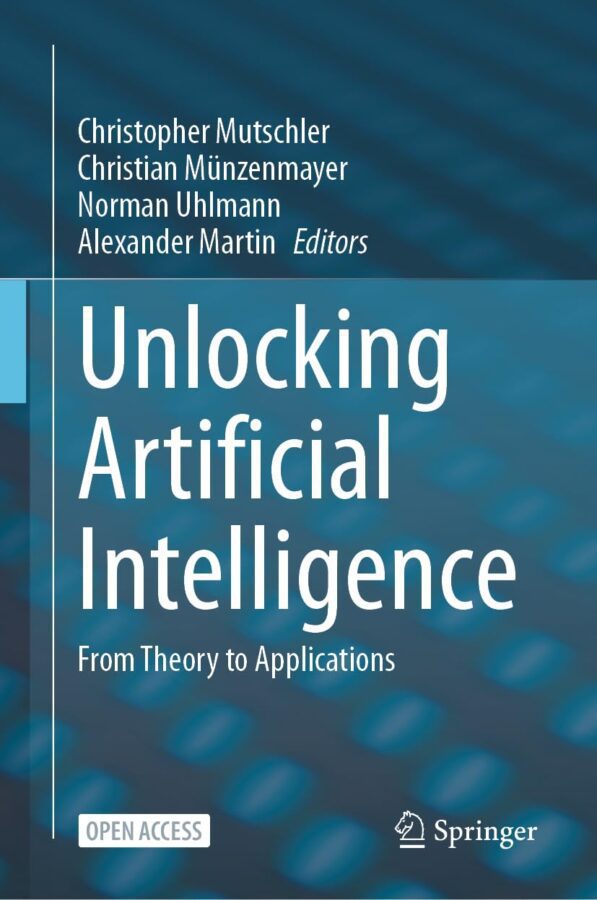A State-of-the-Art Guide Bridging AI Theory and Practice
“Unlocking Artificial Intelligence: From Theory to Applications” by Christopher Mutschler, Christian Münzenmayer, Norman Uhlmann, and Alexander Martin is a standout open-access resource that has quickly gained popularity in academia and industry. This book provides a timely, in-depth overview of the landscape of artificial intelligence and machine learning, making it an essential read for professionals, applied researchers, and students eager to understand both the theoretical foundations and the practical deployment of AI in real-world settings. Its free availability and clear structure have contributed to its widespread adoption as a go-to reference for those aiming to bridge the gap between academic research and industrial innovation.
Foundational Concepts and Modern Approaches in AI
The book’s first part is devoted to laying out the theoretical underpinnings of AI and machine learning. Readers are introduced to various approaches, including automated machine learning (AutoML), sequence-based learning, deep learning, learning from experience and data, and process-aware learning. Each chapter demystifies complex concepts, offering clear explanations and illustrative examples that make even advanced topics accessible. This theoretical grounding is invaluable for anyone who wants to understand how AI works, why certain approaches are chosen for specific problems, and how new advances build upon decades of foundational research.
From Research to Real-World Impact: Industrial AI Applications
Where “Unlocking Artificial Intelligence” truly shines is in its second half, which transitions from theory to application. The book presents various case studies and practical examples that showcase how AI transforms industries. Topics include autonomous systems, indoor localization, medical diagnostics, energy supply and smart grids, logistics optimization, traffic control, image processing, and the Internet of Things (IoT). Each application chapter details the unique challenges faced in deploying AI at scale and the innovative solutions researchers and engineers have developed. This structure highlights AI’s versatility and provides actionable insights for practitioners seeking to implement similar solutions in their organizations.
Optimizing Workflows and Creating New Business Models
A recurring theme throughout the book is the transformative potential of AI to optimize workflows, automate processes, and unlock new business models. By analyzing large volumes of data, AI enables organizations to identify patterns, predict trends, and make more informed decisions. The authors emphasize that integrating AI is no longer a luxury but necessary for companies aiming to stay competitive in rapidly evolving markets. The book’s real-world examples illustrate how AI-driven optimization can lead to significant efficiency gains, cost savings, and creating entirely new value propositions across sectors.
Balancing Benefits, Risks, and Responsible AI Adoption
“Unlocking Artificial Intelligence” does not avoid discussing the risks and challenges associated with AI adoption. The authors address critical issues such as data privacy, algorithmic bias, transparency, and the need for robust evaluation frameworks. By presenting both the benefits and the limitations of current AI technologies, the book encourages readers to adopt a balanced and responsible approach to AI integration. The discussion on ethical AI and the importance of explainability is especially relevant for organizations operating in regulated industries or dealing with sensitive data.
Accessible, Free, and Widely Endorsed in Academia
One of the most appealing aspects of this book is its open-access model, allowing anyone to download and read it without barriers. This has made it a popular textbook and reference work in universities and professional training programs worldwide. The clear writing style, logical organization, and inclusion of foundational theory and practical applications make it suitable for a broad audience, from undergraduate students to experienced engineers and decision-makers. The book’s popularity in academic circles is further evidenced by its frequent inclusion in lists of recommended free AI books for 2025
Expert Authorship and Industry Relevance
Christopher Mutschler and his co-authors bring substantial expertise and backgrounds in academic research and industrial innovation. Their collective experience ensures that the book is theoretically rigorous and deeply attuned to the realities of deploying AI in complex, dynamic environments. The authors’ affiliations with leading research institutes and industry partners lend additional credibility and ensure that the content reflects the latest trends and best practices.
Why “Unlocking Artificial Intelligence” Is a Must-Read for AI Learners and Practitioners
For anyone seeking a comprehensive, up-to-date, and practical guide to artificial intelligence, “Unlocking Artificial Intelligence” stands out as a top recommendation. Its rigorous theoretical coverage and hands-on application examples make it uniquely valuable for learning and reference. Whether you are a student building your foundational knowledge, a researcher exploring new directions, or a professional looking to apply AI in your organization, this book provides the frameworks, insights, and inspiration needed to succeed in the era of intelligent automation.
Conclusion: A Benchmark Resource for the AI Community
In summary, “Unlocking Artificial Intelligence” by Christopher Mutschler and colleagues is a comprehensive, accessible, and forward-looking guide that bridges the gap between AI theory and industrial application. Its open-access format, clarity of exposition, and breadth of coverage make it a benchmark resource for anyone serious about understanding and leveraging artificial intelligence in the modern world. Add this book to your digital library to stay informed, inspired, and equipped for the future of AI-powered innovation.


